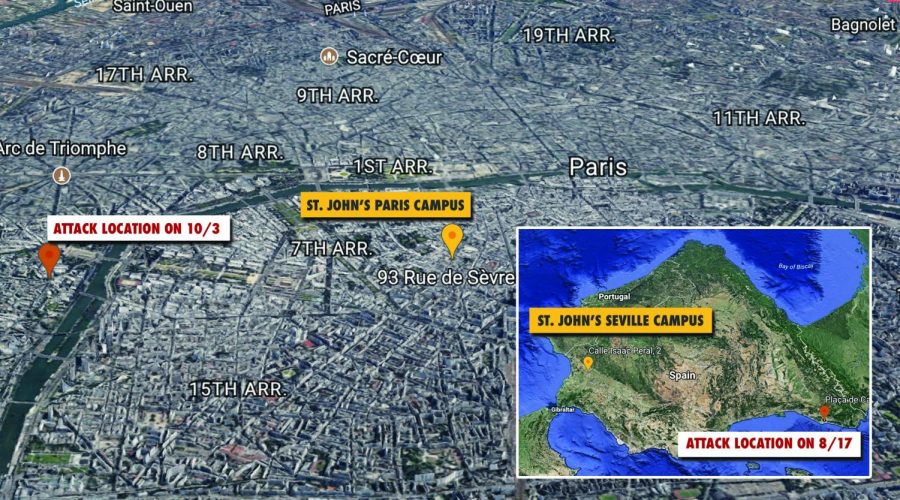When a suspected Islamist militant drove a van into a crowd of people in Barcelona in August, killing 14 people and injuring 100, St. John’s says its public safety teams based both stateside and abroad responded swiftly.
Denise Vencak, the new head of Public Safety, said that in the immediate wake of the attack, she and her team successfully reached out to every St. John’s student on its Seville, Spain campus to ensure they were safe.
“Within a couple hours, we were able to contact and reach out to every student that was in the country at the time and we knew that they were safe,” Vencak said in a recent interview with the Torch, adding that this method is reliant on students giving the University their updated contact information.
In light of recent terrorist attacks abroad, students have expressed interest in the public safety procedures practiced on the St. John’s Seville, Paris and Rome campuses. Vencak says that while the approach to security is the same abroad, the execution differs because the campuses are over “3,000 miles away.”
“We just continually enhance and adjust [safety procedures] based on what’s going on in the world.” Vencak said.
To disseminate information to students via mass text message, the University uses the MIR3 system. But how they use it changes overseas.
“We can use that for specific groups,” Vencak said. “So we have it set up just for the global campuses, we’ll send the message out to the 300, 400 students that are in each country, letting them know that they need to reach out to us and contact us back. In any emergency, time is of the essence, you want to get as much information as you can.”
She added that these very same methods are used at all of the University’s campuses abroad, which will include Limerick, Ireland beginning next semester in addition to the existing Paris, Rome and Seville campuses.
Western Europe has faced a recent wave of terror attacks and violent incidents in public spaces.
According to CNN, a man attacked two women with a knife in Marseilles’ Saint-Charles train station on Oct. 1 killing them both. That same weekend on Oct. 3, Paris police found and deactivated an explosive in an apartment building in the city’s 16th arrondissement. ISIS later claimed it was behind the attacks.
Just a few weeks prior on Sept. 17, Saint-Charles train station was also the scene of an acid attack against four American college students studying abroad in Paris; two of them were reportedly hospitalized for burns. According to CNN, the attacker was a 41 year-old woman who was deemed mentally unstable and hospitalized.
St. John’s students abroad often travel from their campus to other cities and countries; Vencak said that as a result, they are required to undergo a weekly information session to keep them vigilant and aware of their surroundings.
“We have a form at the [front] desk of each of the campuses, so when the students are leaving on Thursday or Friday for their long weekend, we ask them to fill it out and we push a little bit harder because of what’s going on in the world.” Vencak said. “I mean, it’s still voluntary, but we push and ask them to give it to us.”
Vencak said that she and her team also continuously check safety conditions through the OSAC [Overseas Security Advisory Council] database and relay any relevant information to students.
Natalia Gierber, a junior who studied abroad on the Rome campus last spring, believes the security at the Rome campus is up to par.
“I definitely felt safe while I was abroad,” Gierber said. “The safety abroad seemed to be more secure than the safety on the Queens campus in terms of 24-hour procedures. The Queens campus has high security after 10 p.m. when all of the gates are locked, while the Rome campus has high security all day.
“There isn’t really a way for anyone that is not a St. John’s student to get onto campus in Rome.”
According to Vencak, the stateside Public Safety team also has access to security footage of all campuses abroad, and the watchmen who occupy each lobby desk abroad call Vencak’s team at least three times a day to keep them updated. Each watchman also individually verifies the Stormcard of every person that comes in.
Krislyn Vara, a sophomore who is currently studying abroad on the Paris campus, said, “We have to use a special key to get into the buildings in Paris. This makes me feel safe because no one is able to get into the campus without the key.”
Vencak added that the University has strong relationships with “the local consulates and local governments, the embassies in the area,” and that a regional security officer is also assigned to each global campus under OSAC.
“We can call them up and ask them any questions, and he’ll give us a heads up, like if there’s going to be a demonstration in Rome that’s going to be close to campus or if there’s an epidemic or some type of a medical condition happening,” Vencak said. “He’ll give us a heads up and we’ll give the information out to our students in advance.”
Sarah Gebreyesus, a junior who is currently studying abroad on the Seville campus, isn’t concerned about her safety, citing the security measures.
“Campus security in Seville is just as strict as it is in Queens,” Gebreyesus said. “I feel overly safe here.”














